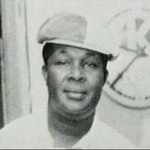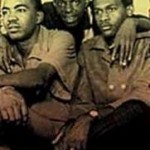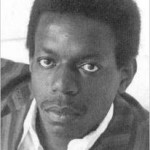By Roy Black—-
Falsetto singers were an integral part of early Jamaican music. Some of the more popular exponents of that style of singing, along with their signature recordings, included Pat Kelly (You Don’t Care For Me), Derrick Harriott (Sugar Dandy), Ken Parker (True True True), Cornel Campbell (Queen Of The Minstrel), Lloyd Parks (Officially), and Junior Marvin (Police and Thief). A method of voice production, the falsetto was used only by male singers, particularly tenors. It forced such singers to attempt notes that are higher than the normal range, thus giving the impression that their delivery is in a false voice, and not their natural voice.
Although this may be true, as it relates to Derrick Harriott, for example, who had hits using both his natural voice (Solomon, Do I Worry, Walk The Streets at Night) and his falsetto voice (Sugar Dandy, What Can I Do, My Three Loves), the same could not be said about Cornel Campbell and the incomparable Slim Smith.

NO LABEL
Smith’s delivery was so unique that musicologists found it difficult to put a label on his style. Rated by thousands at home and abroad as the greatest local pop singer ever, it was easy for Smith, while singing in his natural falsetto, to slip into a throat sound and then ease into a more piercing falsetto without changing gears. The plain truth is that Smith’s falsetto was also his natural voice. It was as smooth as velvet and as sweet as honey.
Born Keith Alexander Smith in a musical family in Kingston on December 5, 1948, the pencil-thin youngster expressed from early a wish to be a singer. His mother, with whom I had a chat some years ago from her Greenwich Town residence, confirmed that her son attended The Chetolah Park Primary School and later Kingston Senior – now known as Kingston High School. The institution, which had regular concerts, saw Smith linking with schoolmates Winston Riley, Franklyn White and Frederick Waite (father of several members of the British group Musical Youth) to entertain their schoolmates.

After School
After leaving school, the quartet, with Smith as lead vocalist, became a regular fixture at Edward Seaga’s Wellington Street-based Chocomo Lawn – a popular west Kingston entertainment center. While there, they developed an alliance with the Richards Brothers to form the Victors Youth Band. It was a period when Smith honed his vocal talents during rehearsals and regular shows at the venue.

Stranger Cole, a more seasoned campaigner in the business at the time, was instrumental in getting them into studio. He traced the early steps during an interview I had with him: “I used to visit Chocomo when they used to rehearse with the little band, and I was like a talent scout for producer Duke Reid. So I told Mr Reid that I heard some guys singing and they were very good. He told me to go and get them, and I did. And they went there and recorded Little Did You Know in 1965″ – a ska number backed by the Baba Brooks band, which went straight to No. 1 on the Jamaican charts and brought Smith to prominence.

NEW NAME
The group, now known as The Techniques, followed up in that same year with a plethora of similar-sounding hits that included What You Gonna Do, I’m in Love, Telling Lies, You Don’t Know, I’m So In Love With You – all led by Smith – along with a slow piece of enormous proportions titled A Place Called Love for producer and group leader Winston Riley. This virtually immortalised Smith forever. It has gone down in Jamaica’s music history, almost unchallenged, except for Keith and Enid’s Worried Over You, as Jamaica’s most classic R&B ballad of all time.
With the break-up of the group in 1965 and the dawn of the rocksteady era in 1966, Smith went solo and recorded for Studio 1 the cuts Rougher Yet, Never Let Go and Born To Love You, which sold heavily at home and abroad.

By mid-1967, Slim Smith was again in the group-singing mood and formed The Uniques. According to Rodguel Sinclair, aka Blackbeard, a close friend of Smith and a prolific record producer of the 1970’s, “The group first formed with Slim Smith, Roy Shirley and Ken Boothe and did a few cuts for a producer named Kenlac. After disbanding, Smith moved to producer Bunny Lee and formed the second set of Uniques with Ken Boothe and Derrick Morgan and did, arguably, the first rocksteady song, called People’s Rock Steady.” A third set of Uniques, and perhaps the one music fans are most acquainted with, comprised of Smith, Lloyd Charmers, and sometimes Martin ‘Jimmy’ Riley.
With Smith on lead or as a solo artiste the hits flowed unabatedly from Bunny Lee’s catalog. Who could ever forget My Conversation – a 1968 No. 1 song on the Jamaican charts, originally sung by Smith and Lloyd Charmers? Or The Beatitude, Give Me Some More Of Your Loving, Build My World Around You, Girls Like Dirt, Ain’t Too Proud To Beg and Let Me Go Girl – The biggest hit of 1967, written by B.B Season and sung by Seaton, Smith and Lloyd Charmers.

ANOTHER LEVEL
The rocksteady beat was taken to another level when Smith sang lead on the Winston Lowes – produced double Watch This Sound and the tear-jerker Out Of Love. Then, Smith indulged in what could be described as a premonition of his impending doom when he recorded the irrepressible The Time Has Come – his last major hit done in 1971.

On the night of October 12, 1972, Smith, who had been suffering from a bout of mental disorder since his return from England earlier that year, thumped a window glass with his bare hands at Northumberland Avenue in Franklin Town, just a few doors below my residence. He bled to death before paramedics could intervene. He was 23 years and 10 months old.



You must log in to post a comment.